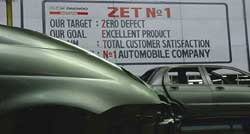It`s the greenest one
 Daewoo took off from where Toyota left and since then there has been no looking back. The company that had its genesis in a joint-venture with dcm Limited, after the latter's experiment with the Japanese auto giant failed, has today catapulted to a position of supremacy among a host of contenders.The reason: its successful manoeuvring of an apparently bad situation. Pumping strength into the weak infrastructure that it inherited in 1994, Daewoo has an installed capacity of 72,000 cars from its production facility in Surajpur industrial area near the capital. Its exceptional performance is credited to sustained corporate leadership coupled with a positive approach towards popular global practices. The company has scored a high 55.39 per cent to rank first in this indicator which has seen some of the top players languishing at the bottom of the ladder.
Daewoo took off from where Toyota left and since then there has been no looking back. The company that had its genesis in a joint-venture with dcm Limited, after the latter's experiment with the Japanese auto giant failed, has today catapulted to a position of supremacy among a host of contenders.The reason: its successful manoeuvring of an apparently bad situation. Pumping strength into the weak infrastructure that it inherited in 1994, Daewoo has an installed capacity of 72,000 cars from its production facility in Surajpur industrial area near the capital. Its exceptional performance is credited to sustained corporate leadership coupled with a positive approach towards popular global practices. The company has scored a high 55.39 per cent to rank first in this indicator which has seen some of the top players languishing at the bottom of the ladder.
Where most automobile companies are content to issue manuals on pollution control equipment, Daewoo has gone a step ahead by issuing a separate newsletter and periodical advertisements as updates on engine design and environmental issues. Besides, it offers the longest warranty period and maximum free service to ensure that the vehicle does not fall into unreliable hands. As a customer support infrastructure, it has a network of 110 dealers and 100 authorised service stations all over India.
The overall success also stems from the company's ability to be at the forefront of incorporating new technologies in its vehicle. It has undertaken considerable research and development in its design, studying the impact of fuel quality and ageing emissions. Today, Daewoo sports an entire vehicle fleet based on petrol and is also among the few to introduce factory-fitted cng passenger car (Cielo) and Euro ii vehicle at a time when carburettor-based models throng the roads.
Nevertheless, the company has its share of grey areas. Despite faring above average with a score of 38.63 per cent in corporate environment policy and management systems, it leaves much to be desired when pitted against top scorer like Maruti. While the company is still to be certified for iso 14001, it does have a comprehensive environmental policy. But since it is signed by the middle-level management and needs improvement in terms of communication to the people at large, its acceptability has been somewhat restricted.
Unfortunately, the company's environment department like the rest of the auto sector, has been clubbed with the utility department. Another area where it loses out is environmental management systems (ems) certification, which is yet to receive the green signal. And though there is a well-defined nodal committee to monitor the environmental performance, the company has failed to take maximum advantage of this infrastructure.
Its major cause for concern, however, is the absence of specific procurement policy and guideline for selection of suppliers in terms of environmental impact. The company outsources a huge chunk of both primary and secondary components from large-scale vendors. This is particularly true in the case of its top product Matiz. Thus, like most others, the company carries the burden of environmental pollution in a more oblique fashion while appearing to be ecocompliant.
The company has also recorded a lacklustre performance in consumption efficiency, meeting only 13 per cent of its energy demand from clean gaseous fuels. It is still dependent on groundwater to meet its entire water requirements even though rainwater can be explored as a suitable option. Nor for that matter, has it kept a watch on the liquid waste generated from the machining shop. Nevertheless, the company has been largely successful in pollution control and prevention. Daewoo has topped the product use and owes its exceptional success in this field to Matiz. In product disposal, the company occupies the lower rung but this is reflective of the performance of the entire auto sector.
DAEWOO | ||
| Parameters | Score (percentage) | Ranking |
| Corporate environment policy and management system | 38.63 | 11 |
| Corporate leadership and proactive environmental initiatives | 55.39 | 1 |
| Procurement policy and supply chain management | 16.84 | 18 |
| Process and consumption efficiency | 39.49 | 8 |
| Pollution, pollution control and prevention | 37.02 | 9 |
| Product use | 49.46 | 1 |
| Product disposal | 3.77 | 15 |
Related Content
- Schools from Punjab, Karnataka and Haryana bag the top awards as India’s greenest schools
- Volkswagen revs up bid to become world's greenest carmaker
- Sikkim India’s greenest State, 47.3 per cent land forested
- Rooftop revolution: unleashing Delhi’s solar potential
- The 'phoenix town' soars
- Cyclone alters Yangon's tree-lined streets
